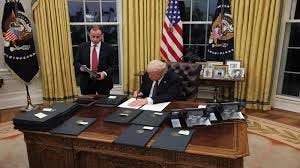Federal Workers on Leave Under Trump's DEI Order Express Anger and Fear for the Future
Longtime civil servants say they’ve become pawns in a political battle and are fearful of increased surveillance as their work on diversity, equity, and inclusion is dismissed.
Federal employees impacted by President Donald Trump's recent executive order halting diversity, equity, and inclusion (DEI) programs within government agencies are expressing frustration and fear as they face forced paid leave. Many of these workers, who have dedicated decades to public service, feel targeted and misunderstood as part of the administration’s broader political agenda.
The order, which was issued by the Office of Personnel Management (OPM) last Wednesday, came with immediate consequences. Workers were notified that they would be placed on paid leave, effective immediately. For some, the reality of a job being stripped away has turned their world upside down. One employee, who has worked for over two decades in a federal agency, said, "I’m mad... I’ve put 23 years of blood, sweat and tears into this agency," but now, he fears that his DEI role—previously decommissioned in anticipation of Trump’s policies—could be eliminated for good.
The order aligns with Trump’s promise from his inaugural address to dismantle policies that aim to address race and gender disparities in the workplace. It is seen as the culmination of his longstanding pledge to build a "merit-based" society, removing what he views as divisive policies. The OPM memo also set a January 31 deadline for agencies to submit written plans for the dismissal of those placed on leave.
The effects of this order extend beyond the government workers directly impacted. A woman of color, who was placed on leave under the new directive, shared her fears for her financial future. She had already been bracing for the change by budgeting for her family, but the suddenness of the order still left her reeling. "It’s disheartening that we’ve become pawns in this grapple for control," she said, referencing the broader political struggle playing out at the expense of her career.
Workers involved in DEI initiatives in federal agencies have seen their work on policies such as gender transition guidelines and equity in hiring practices abruptly halted. One LGBTQ+ employee, who led initiatives in his agency, reported that public-facing policies meant to assist gender transitioning employees have now been taken down. Without these resources, workers undergoing transitions must navigate the process alone, creating an undue burden on them.
For many, the consequences extend beyond their professional roles. Several workers revealed that since Trump’s re-election, some LGBTQ+ employees are planning to return to the “closet,” fearing retaliation or discrimination. "My plan is to be invisible for the next four years," said one worker, voicing the overwhelming sentiment of fear that pervades the federal workforce.
The impact of Trump’s order is also being felt at organizations like the Wilson Center, which announced it was closing its DEI offices and ceasing related contracts. Trump has also ordered other government bodies, including the Federal Aviation Administration, to halt similar initiatives. Critics argue that these programs, which have been in place for decades, help to ensure representation and fairness for minority groups within the government.
White House Press Secretary Karoline Leavitt defended the order, saying, "President Trump campaigned on ending the scourge of DEI from our federal government and returning America to a merit-based society." However, experts point out that these policies were implemented in response to systemic inequalities and were aimed at making the federal workforce more representative of the American population.
According to data from the Partnership for Public Service, people of color and women remain underrepresented in federal government roles, with white workers holding 59.5% of jobs and men holding 55% of positions. The move to dismantle DEI programs threatens to undo years of progress, critics argue, potentially reducing opportunities for marginalized groups to secure federal employment.
As many federal employees grapple with uncertainty, some are worried that Trump's actions will lead to a new era of government hiring based on loyalty rather than merit. Jesús Soriano, president of the American Federal Government Employees Local 3403, criticized the decision, stating, "This is another way for President Trump to undermine the merit-based civil service."
As the fallout continues, many employees are left wondering what the future holds, with little clarity on how the administration’s policies will evolve. For now, the fear and frustration felt by federal workers continue to grow as they navigate a new political landscape that threatens to reshape their careers and lives.
For more updates on this ongoing situation, follow our coverage.


